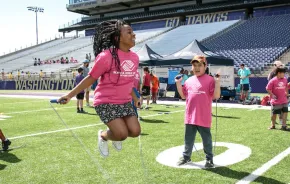
What if I told you that you are being watched?
You are being watched, closely. By your child. With every move you make, a pair of eyes observes, encodes, memorizes and prepares to act like you. Of course, you are aware of this if your child has ever repeated an unfortunate curse word you uttered in traffic.
But it goes beyond words. Our children soak up our attitudes, beliefs and world views like little sponges. As a clinical psychologist who specializes in treating body-image and eating disorders in young people, and as a mother of my own two kids, I want to hire a sky-writer to trace these words for all parents to see:
Your child will only love their body as much as you love yours.
So, listen up, moms and dads. This is important. You can be their first and most influential teacher about loving and appreciating their bodies, the differences between bodies, what is “normal” for bodies (and this is a broad range), what the media (mis)represents about bodies and how to practice weight-neutrality.
Body-image role modeling reminds me of the lessons we give our children about racial equality, respecting people with disabilities, helping others — why shouldn’t we be as proactive in teaching our kids about being respectful toward the bodies they were born with and toward others’ bodies?
What we know is that negative body image can lead to disordered eating and eating disorders. On the other hand, good body image can result in greater confidence, better eating habits, an active lifestyle and better health habits in general.
So, what can we do to be the best teacher and example for our children? First, here are the top 5 statements you can make to your child or teen in support of good body image and health:
1. “Your body is healthy and strong”
Celebrate the things their bodies can do rather than the way their body looks. This will help cultivate in your child a sense of appreciation for their abilities. Can they swim? Rock climb? Throw a ball far across the park? These activities bring happiness and fulfillment. It is important to consider your body as an instrument for joyful movement rather than just a pretty accessory.
2. “Fat is not a feeling”
If your child says he or she feels “fat,” ask them to describe more specifically what they are feeling. Are they feeling worried about what their classmates will think of them? Are they feeling insecure about the first day at a new school? Are they feeling stressed about applying for college? The act of describing your negative feelings has been shown in studies to be very helpful in reducing sadness, anger, and pain — who doesn’t want that? Help them find words if they don’t have the words. As an adult, you have a great vocabulary to describe your feelings and this is something you can teach so that bad feelings aren’t reduced to “feeling fat.”
3. “There are no such things as ‘good’ foods and ‘bad' foods”
Kids can be drawn to the idea that bad body image can be helped by eating “good foods” or by being on a diet. Teach your children that all food consists of varying levels of nutrition and calories. But even foods low in nutrition and high in calories have a place in our diets. Sharing treats can be important for relationship building (consider birthday parties and even just summer afternoons with friends at the ice cream truck). Having an attitude that certain foods are “bad” sets you up to feel like you have been “bad” by eating them. And, by the way, restrictive diets don’t work and tend to make people feel worse about their bodies. Our bodies deserve to be fed in a way that is not rigid or self-shaming.
4. “Let’s go for a walk!”
Physical activity — even a 10-minute walk — has been shown in research to improve body image as well as a person’s mood, reduce anxiety and stimulate creativity. The added benefit of a walk with mom or dad is a chance to just let them talk about what is on their mind.
5. “I love my body”
… Did I lose you there? Really, say this aloud. Say, “I love my strong legs that I got from my mother — I can hike steep trails” or “I love my thick arms because they help me give you the strongest hugs.” For some, this won’t be a struggle. For others, you might feel like you are lying through your teeth. Either way, it is crucial for kids to hear that you approve of your own perfectly imperfect body. Just imagine: if you don’t accept your body, why should they expect that their body is acceptable to you or anyone else?
Perhaps even more important than what parents say to kids is what parents do. Here are some challenges for parents:
- Wear your swimsuit without hesitating in front of the mirror or covering up. Model being comfortable with your body in general even with all of its (perceived) imperfections. This will teach your daughters and sons to be comfortable with their bodies. It will also teach your children what a real body looks like as opposed to the airbrushed and modified pictures of bodies they see in the media every day. Your child’s future girlfriend or boyfriend will also have a real body — and she or he will appreciate not being judged for being real.
- Do not comment on other people’s bodies. If you are a people-watcher when it comes to the beach or pool, comment instead on fun swimsuits or hairstyles.
- If you do struggle with your own body image, don’t engage in fat talk. Studies on fat talk (for example, saying that you don’t like your chubby knees or the way your tummy bulges) show that talking about your body negatively makes you — and the people around you — feel worse about their bodies.
- Make it off-limits for anyone in your home to tease or criticize others for being heavy (or skinny) or criticize any other aspects of appearance. Teasing and criticism by parents and siblings about weight or body shape occurs in about 80 percent of women who develop an eating disorder in college. This is something you can do to protect your children from future problems.
- Talk to your kids (of all ages) about how they feel about their body. All kids make comparisons between their bodies and other kids’ bodies. It might be innocent comparisons in first grade (“Sarah has a big tummy”) and more judgmental in eighth grade (“I’m the fattest kid in the class”). Opening up a conversation about this can give you the opportunity to share the important message of accepting all body shapes and sizes.
- Talk about images you see on television, in magazines — and on social media! Tumblr, Facebook, Instagram … all of these sites (and more) tend to be the source of images to which tweens and teenagers compare themselves. Teach them about the way friends and classmates choose to take selfies (picking certain angles to look more attractive, using filters), and how celebrities and models are Photoshopped to eliminate imperfections. Encourage them to seek out reality in a world of surreality by noticing “normal” looking people online and in print.
- Throw out those fashion magazines, celebrity rags and — hear me out for a moment — fitness magazines. A recent study found that 20 percent of stories in top-selling fitness magazines focus on body shaping and weight loss. Maybe that doesn’t sound problematic at first, but consider how these two topics prioritize appearance over health.
- Bring up in conversation the fact that of the people we most admire, their body is not typically the source of our inspiration. Does anyone care whether Rosa Parks had a round tummy? Whether Hillary Clinton has cellulite? And when a woman’s face finally adorns the $20 bill, I assure you, it isn't because she had a hot body.
In the end, your words and actions are not the only things that affect your child’s body image — there are a lot of influences in society, and they will have many experiences that will shape their attitudes about themselves. But a mother’s and father’s teachings about appreciating and accepting their own and others’ bodies create an important foundation on which children can stand tall. As your child looks in the mirror, they will smile at what they see.
Editor’s note: This article was originally published in 2015, and updated in January 2020.











